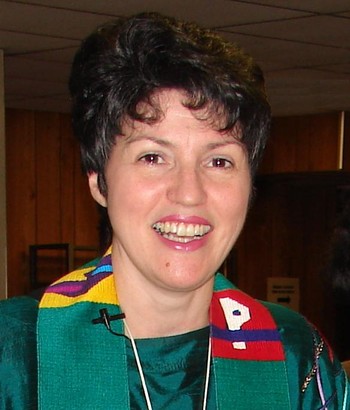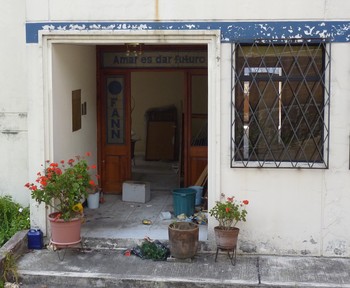A space for a contemporary woman disciple to give voice to justice concerns in a world where some still think that women’s words are just leros (Greek for “nonsense”) or, in Spanish, disparates
 Orphans and widows
Orphans and widows
A reflection and confession based on James 1:22–27
by Magdalena I. García
But be doers of the word, and not merely hearers who deceive themselves. For if any are hearers of the word and not doers, they are like those who look at themselves in a mirror; for they look at themselves and, on going away, immediately forget what they were like. But those who look into the perfect law, the law of liberty, and persevere, being not hearers who forget but doers who act—they will be blessed in their doing. If any think they are religious, and do not bridle their tongues but deceive their hearts, their religion is worthless. Religion that is pure and undefiled before God, the Father, is this: to care for orphans and widows in their distress, and to keep oneself unstained by the world. —James 1:22–27
Do you know what they teach
at typesetter school?
“An orphan has no past,
a widow has no future.”
Writing that is perfect and flawless
cures orphans and widows
by adjusting space and adding details.
Do you know what they teach
at discipleship school?
“An orphan should not be abandoned,
a widow must not go on alone.”
Religion that is pure and undefiled
cares for orphans and widows
by lending a hand and offering hope.
Fulfilling the Great Commandment
demands that we renounce all prejudice
and take up the cause of the disempowered:
those who are vulnerable
to impoverishment and injustice.
Focusing on the Great Commission
is not a license to perpetrate violence
and to execute the agenda of the empowered:
those who are driven
by conquest and dominion.
Regardless of our motivation,
whether the Great Commandment or the Great Commission,
our common calling remains the same,
and orphans and widows
are at the top of the list
of those we are to love and serve.
Forgive us, Adopting God,
for reducing religion
to ritual practices and escapist spiritualism
at the service of some and the expense of others.
Teach us, Protecting God,
to live out true faith
by embodying your love and being doers of the Word
for the sake of all humanity.
Magdalena I. García is a PC(USA) teaching elder and a hospice chaplain for Vitas Healthcare in Chicago. She is a graduate of McCormick Theological Seminary and a recipient of the 2008 PC(USA) Women of Faith Award. For permission to use content, write to magdalenagarcia@comcast.net.

An orphanage in Quito lies in ruins due to financial crisis. The welcome sign over the main door featured the institution’s slogan: “Love is giving a future.”
Huérfanos y viudas
Una reflexión y confesión basada en Santiago 1:22–27
por Magdalena I. García
Pero pongan en práctica la palabra, y no se limiten sólo a oírla, pues se estarán engañando ustedes mismos. El que oye la palabra pero no la pone en práctica es como el que se mira a sí mismo en un espejo: se ve a sí mismo, pero en cuanto se va, se olvida de cómo es. En cambio, el que fija la mirada en la ley perfecta, que es la ley de la libertad, y no se aparta de ella ni se contenta sólo con oírla y olvidarla, sino que la practica, será dichoso en todo lo que haga. Si alguno de ustedes cree ser religioso, pero no refrena su lengua, se engaña a sí mismo y su religión no vale nada. Delante de Dios, la religión pura y sin mancha consiste en ayudar a los huérfanos y a las viudas en sus aflicciones, y en mantenerse limpio de la maldad de este mundo. —Santiago 1:22–27
¿Sabes lo que enseñan
en la escuela de tipografía?
“Un huérfano no tiene pasado,
una viuda no tiene futuro”.
La escritura que es perfecta y impecable
remedia los huérfanos y las viudas
ajustando el espacio y añadiendo detalles.
¿Sabes lo que enseñan
en la escuela del discipulado?
“Un huérfano no debe ser abandonado,
una viuda no debe continuar a solas”.
La religión que es pura y sin mancha
cuida de los huérfanos y las viudas
tendiendo la mano y ofreciendo esperanza.
Cumplir el Gran Mandamiento
demanda que renunciemos a todo prejuicio
y que asumamos la causa de los desapoderados:
aquellos que son vulnerables
al empobrecimiento y la injusticia.
Enfocarnos en la Gran Comisión
nos es una licencia para perpetrar violencia
y ejecutar la agenda de los apoderados:
aquellos que van impulsados
por la conquista y el dominio.
Así que no obstante nuestra motivación
—el Gran Mandamiento o la Gran Comisión—
nuestro llamamiento común sigue siendo el mismo,
y los huérfanos y las viudas
están a la cabeza de la lista
de quienes debemos amar y servir.
Perdónanos, Dios Adoptador,
por reducir la religión
a prácticas rituales y espiritualismo escapista
al servicio de unos y a expensas de otros.
Enséñanos, Dios Protector,
a vivir la verdadera fe
encarnando tu amor y siendo hacedores de tu Palabra
en aras de toda la humanidad.
Magdalena I. García es anciana docente en la IP(EUA) y capellana de hospicio para Vitas Healthcare en Chicago. Se graduó del Seminario Teológico McCormick y recibió el Premio a las Mujeres de Fe de su denominación en el 2008. Para solicitar permiso para usar el contenido, escriba a: magdalenagarcia@comcast.net.